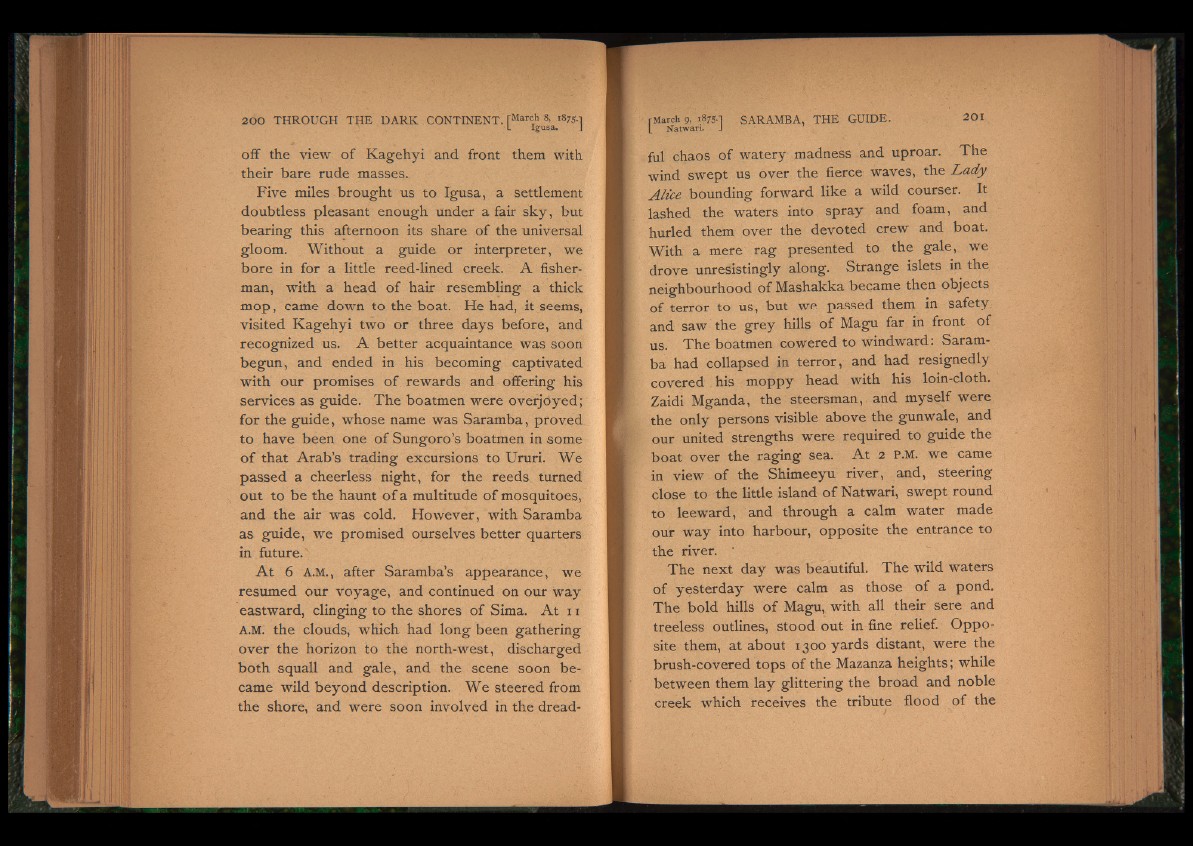
off the view o f K a g eh y i and front them with
their bare rude masses.
Five miles brought us to Igusa, a settlement
doubtless pleasant enough under a fair sk y , but
bearing this afternoon its share o f the universal
gloom. Without a guide or interpreter, we
bore in for a little reed-lined creek. A fisherman,
with a head o f hair resembling a thick
mop, came down to the boat. He had, it seems,
visited K a g eh y i two or three days before, and
recognized us. A better acquaintance was soon
begun, and ended in his becoming captivated
with our promises o f rewards and offering his
services as guide. T he boatmen were overjoyed;
for the guide, whose name was Saramba, proved
to have been one o f Sungoro’s boatmen in some
o f that A rab ’s trading excursions to Ururi. We
passed a cheerless night, for the reeds turned
out to be the haunt o f a multitude o f mosquitoes,
and the air was cold. However, with Saramba
as guide, we promised ourselves better quarters
in future.
A t 6 A.M., after Saramba’s appearance, we
resumed our v o y a g e , and continued on our w a y
eastward, clinging to the shores o f Sima. A t 11
A.M. the clouds, which had long been gathering
over the horizon to the north-west, discharged
both squall and gale, and the scene soon became
wild beyond description. W e steered from
the shore, and were soon involved in the dreadrM
a rc h 9, 1875.1 SARAMBA, THE GUIDE. 201
L Natwari. J
ful chaos o f watery madness and uproar. The
wind swept us over the fierce waves, the Lady
A lice bounding forward like a wild courser. It
lashed the waters into spray and foam, and
hurled them over the devoted crew and boat.
With a mere rag presented to the gale, we
drove unresistingly along. Strange islets in the
neighbourhood o f Mashakka became then objects
of terror to u s , but we passed them in safety
and saw the g re y hills o f Magu far in front o f
us. T he boatmen cowered to windward: Saramba
had collapsed in terror, and had resignedly
covered his moppy head with his loin-cloth.
Zaidi Mganda, the steersman, and myself were
the only persons visible above the gunwale, and
our united strengths were required to guide the
boat over the raging sea. A t 2 P.M. we came
in view o f the Shimeeyu river, and, steering
close to the little island o f Natwari, swept round
to leeward, and through a calm water made
our w a y into harbour, opposite the entrance to
the river. *
T h e next d ay was beautiful. The wild waters
o f ye ste rday were calm as those o f a pond.
The bold hills o f Magu, with all their sere and
treeless outlines, stood out in fine relief. Op p o site
them, at about 1300 yards distant, were the
brush-covered tops o f the Mazanza h e igh ts ; while
between them la y glittering the broad and noble
creek which receives the tribute flood o f the